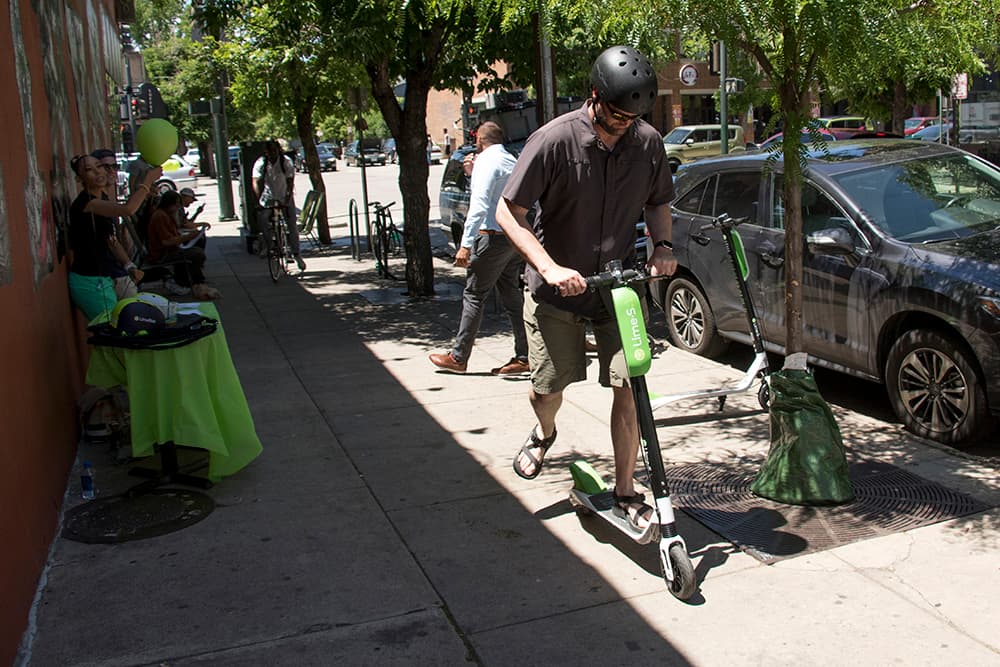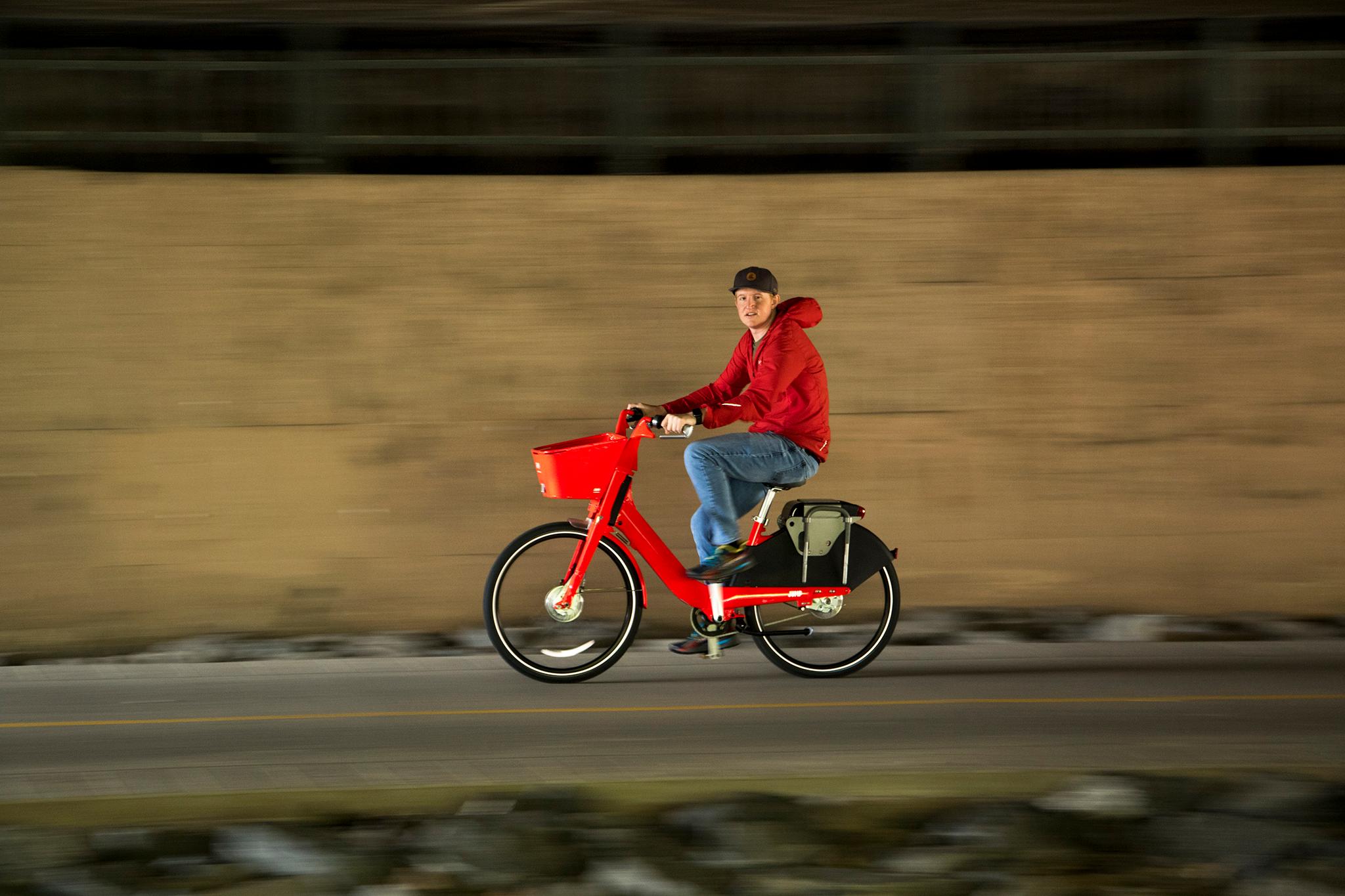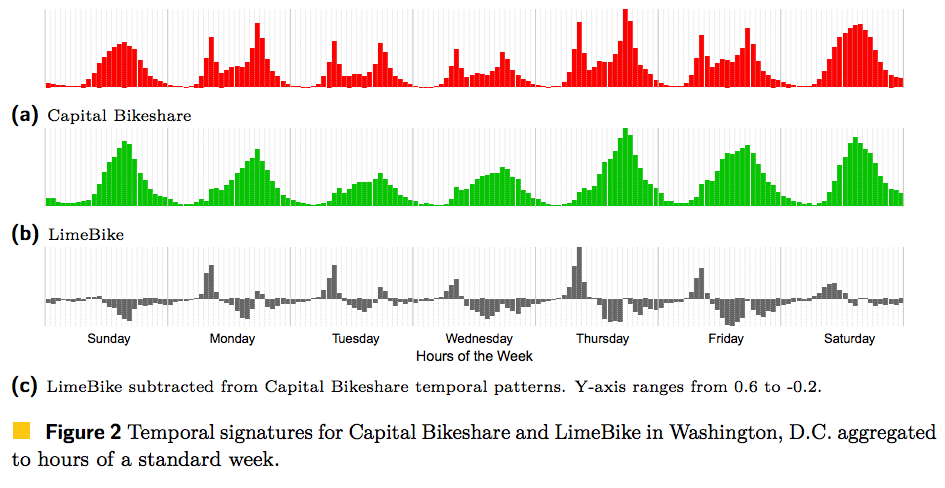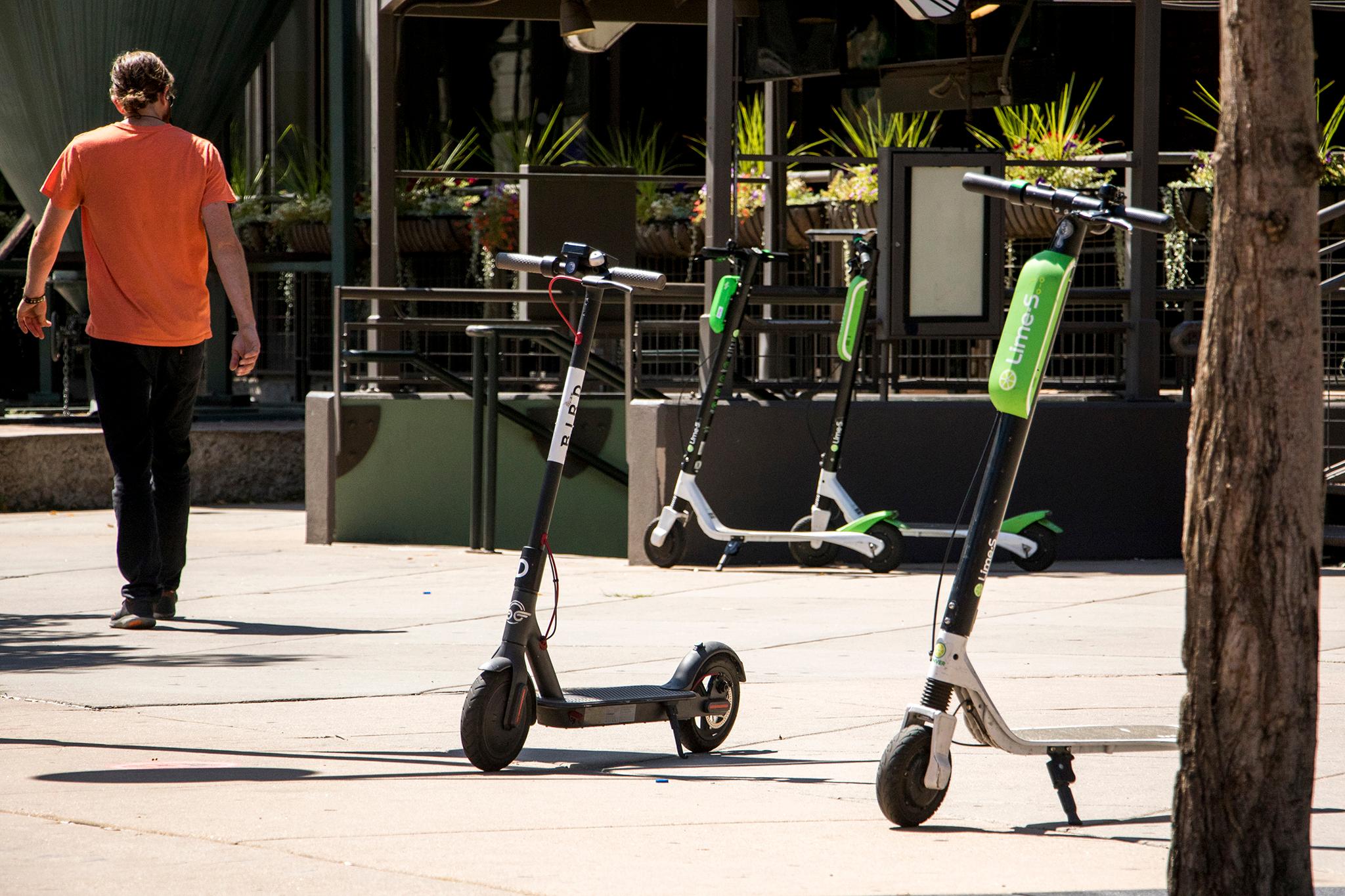It's been just about over a month since the city issued permits allowing dockless scooter and bike companies to operate with Denver, and because the public appetite for scooter drama is insatiable, we're taking a moment to check in.
The Dockless Mobility Pilot Permit Program, as it's officially known, is still ramping up. The Scooter Wars, as they're unofficially known to weary journalists, show no signs of winding down.
What's it like out there?
Eight permits were issued to seven different companies: Lime, Bird, Lyft, Spin, Razor, Zagster and Jump (Lyft got a scooter permit and a bike permit). So far, only Lime, Bird and Jump have deployed their fleets. If it felt like more to you, that's because it's already quite a lot of vehicles. Now, in addition to 737 B-Cycle bikes (according to a 2017 report) and 200 dockless Ofo bikes that have long been on the streets, there are 350 Lime scooters, 350 Bird scooters and 200 Jump bikes out there. Jump will eventually increase its number to 500 by early next year.
According to Public Works' timetable, it's about to get a lot more crowded. Spin is scheduled to deploy 350 scooters within about 30 days. Razor is expected to do the same sometime in the next 15 or so days, and Lyft's 350 scooters are coming in September. Lyft will have also 500 bikes on the streets sometime in the next six months, and 150 Zagster bikes are expected any day now.
A representative for Uber, which owns Jump bikes, said more than 1,500 Jump rides were taken in their first weekend in Denver — a number "on par with our biggest launches to date." Lime and Bird were unable to provide data for their first month back.
Are we behaving ourselves?
Hard to say. Public Works is going easy on everyone while the companies work out the kinks and riders learn the rules.
Public information specialist Heather Burke said no fines have been issued to the companies since the pilot program began. (You may recall 264 were issued when they showed up by surprise and were ordered off the streets earlier this summer.) Public Works is monitoring the situation and stays in touch with the companies about compliance issues.
The city hasn't ticketed any riders, either.
"This is a new mobility option for Denver, so we know there’s going to be a learning curve," Burke said in an email. "The permits are revocable, so, it’s in the operators' best interest to encourage their users to ride responsibly and park appropriately at bus and transit stops."

Public opinion, naturally, is mixed.
"There’s some people who are very excited and think they’re amazing and there are some people that think they’re the four horseman of the apocalypse," said Councilman Jolon Clark, who sits on the Land Use, Transportation & Infrastructure Committee. "... Interestingly most of the complaints are about safety and that interaction in the pedestrian space. I haven’t heard much about where they’re being parked and how they’re being managed."
For confirmation, you need look no further than Twitter.
Some people are worried about safety:
Others are having a ton of fun:
And some are not having it:
"In my hierarchy, my car is the last choice," Mac Jaehnert told Denverite. He started using different dockless bikes and scooters this summer, particularly to and from the light rail. "... I moved to this neighborhood and this kind of development was because it was so connected to public transit, so to see these new options added on as potential ways to get home is promising, but they haven’t gotten it quite down yet.
"The biggest nuisance of them is just being on the sidewalks and I think that’s the most valid complaint about them," he added. "The scooters are pretty small and discreet, but the bikes take up a lot of space. I've seen people in wheelchairs having to scoot around a bike that was parked on the sidewalk."
What about that sidewalk riding rule?
In a meeting one day before the permits were issued, Denver City Council's Land Use, Transportation & Infrastructure committee heard from Public Works staff about the dockless mobility pilot program and its regulations. There were some concerns about the plan to encourage first-mile, last-mile use with public transportation, but it was the requirement that riders use the scooters on sidewalks because they're classified as "toy vehicles" that really had council members hung up. The consensus by the end of that meeting: that rule needs rethinking.
Clark, who voiced the most concern about the sidewalk rule at last month's meeting, said it's still a top priority.
"I think biggest concern people have is that they’re just too fast for the sidewalks so it’s creating this tension with already insufficient space for pedestrians in the city," he said, adding that it's not very safe for riders either because "our sidewalks are in such horrible condition."

The city's lawyers are reviewing the ordinance language for 'toy vehicles' to see if it'd be possible to change the regulations. "In the meantime," Burke wrote to Denverite, "we ask riders to watch their speeds on the sidewalk and yield to pedestrians at all times."
Clark rides his bike to work almost daily and said he's coexisted with scooters in the bike lane just fine. It'd be a "common sense solution" to let them share that space, he said.
How's everyone else doing?
Denver's sort of on the forefront of dockless mobility tech regulation.
As we reported last month, San Francisco could have been a little bit ahead of us, but at least as of Friday, the city had still not chosen five of the 12 applicants to permit. Portland, though, issued permits the same day as Denver for a pilot program that runs through Nov. 20, the Oregonian reports. The city has only given permits to three companies so far — Bird, Lime and Skip — and there have been two accidents involving scooters. The Oregonian's informal poll shows 63.3 percent of respondents against the scooters and 36.7 percent for them.
Cleveland.com on Sunday published this quick guide to city responses around the country. As you've maybe already heard, the people of Los Angeles have been "hanging dog poop bags off the handle bars, lighting them on fire and tossing them into the ocean." (Probably not all at the same time, but that would be pretty spectacular.) Out in Atlanta, things have gotten a little more serious.
Riley O'Neil, principal at government affairs consulting group Twelve Tone Consulting, said they've continued to monitor the mobility situation in cities across the country since releasing their report on scooter regulations in mid-July. He cited Portland as a city with an especially good grasp on regulations because the department of transportation has done "an amazing job of defining scooters, where they should go, how to ride."
Seattle has just about finished their pilot program, he said, and some companies have had to pull out. Among those that left is Ofo, which has its own dockless bike pilot program in Denver and has been pulling out of other cities. In Chicago, where O'Neil lives, dockless mobility vehicles are helping fill in holes in the dock-based bike sharing system Divvy. That's how he sees the flood of companies playing out everywhere — complimentary services in healthy competition.
"I'm assuming B-Cycle like many other dock-based systems might have reached a funding limit and are now faced with how to cost-effectively expand their networks to the whole city," he wrote in an email. "Dockless e-bikes are the answer and both systems should complement each other. Motivate has recently adapted their fleet to include dockless e-bikes in SF and NYC."
A McGill University study that analyzed use of Washington, D.C.'s Capital Bikeshare and Lime found that Capital Bikeshare — a dock-based system like Denver's B-Cycle — had more commuter trips and the dockless Lime has more non-commuter trips.

Meanwhile, Uber has found that people in San Francisco are passing up Uber Pools in favor of the company's Jump bikes — weather permitting. For early adopters in the city, "Uber trips actually declined by 10 percent," Uber policy researcher Santosh Rao wrote in a post for Medium. "During the workday (Monday-Friday, 8 a.m.-6 p.m.) when congestion is at its worst, this decline in early adopters’ Uber trips was even higher, 15 percent."
So, dockless scooters and bikes haven't killed other modes of transportation yet. Instead, they're filling in the gaps, along with ride-share services and options like Car 2 Go. Moped-share, O'Neil said, could be on the horizon. It's big in Europe and Asia.
"The pilots are an experiment that are happening in a lot of cities," O'Neil added later by phone. "Once there’s transparency in the data … the providers with the best ridership and docking behavior will probably be the providers to stick around the in future."
What's next?
The scooters and bikes will keep coming and the city will keep watching, adjusting the pilot program as necessary on an ongoing basis.
Clark said he expects an update from city attorneys on whether the sidewalk rule could be changed in about a week. He also said that Denver Parks and Recreation is putting together a working group to review its own rules against motorized vehicles in parks and on bike paths. The regulations as they're currently written prevent even electric vehicles out (though Segways can definitely be spotted on the Cherry Creek Trail).
Public Works will complete an evaluation of the ordinances and propose any needed updates sometime in August or September, and as Burke said, will be reviewing that sidewalk rule. In October, the department will have a three-month evaluation of the program including public feedback and utilization data.
If you'd like to weigh, you can email [email protected].













